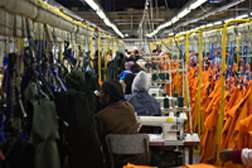Will Latest California Labor Law Citation Finally End Sweatshops?

O & K Apparel Inc. has been ordered by California Labor Commissioner Julie A. Su to pay its 110 employees $113,000 in California overtime wages plus penalties of $61,450 for failing to pay proper overtime, and $307,250 for issuing improper itemized/deduction statements.
In a press release (April 11), Christine Baker, director of the Department of Industrial Relations (DIR), which is a division of the Labor Commissioner’s office, said that employers must pay workers the wages they’ve earned. “And the Labor Commissioner’s office will protect [the employees’] rights, as well as the rights of honest businesses and taxpayers.”
O & K Apparel Inc., which is based in Los Angeles, makes women’s garments and has been paying its employees by the piece, or “piecework.” The California labor code states that garment contractors are required to provide accurate itemized statements to employees showing total hours worked by the employees, and if paid by the piece, they must show the number of pieces produced for specific manufacturers and the rate of pay for each piece in addition to the total hours worked.
In a statement, Labor Commissioner Su said there is no place for sweatshop conditions in our 21st century economy. “Piece rate payment cannot be used as an end-run around the basic requirement that all workers in California receive a just day’s pay for a hard day’s work, including overtime pay for overtime hours worked. In addition, California law requires itemized wage statements so employees know how much they worked and what they earned. In this case, the pay stubs did not include any of that information, which makes it hard for workers to know when their wages are being stolen right out from under them.”
Will some employers never learn? Back in March 2008, seven Hispanic workers filed a federal overtime lawsuit against City Wide Insulation of Madison, claiming that the company violated the federal Fair Labor Standards Act. City Wide thought it could get away with not paying its employees overtime because, they argued, their workers were compensated on a piecework basis. But the judge didn’t see it that way and the workers received about $19,000 each.
More recently, Walmart had its knuckles wrapped regarding piecework. This pay scheme left over from the dark ages intended to make employees work faster and faster within an 8-hour day. But they often work through lunch and don’t take breaks, because if the containers aren’t unloaded in time, they don’t get paid. Walmart lawsuits filed by piecework employees are pending…











No Comments